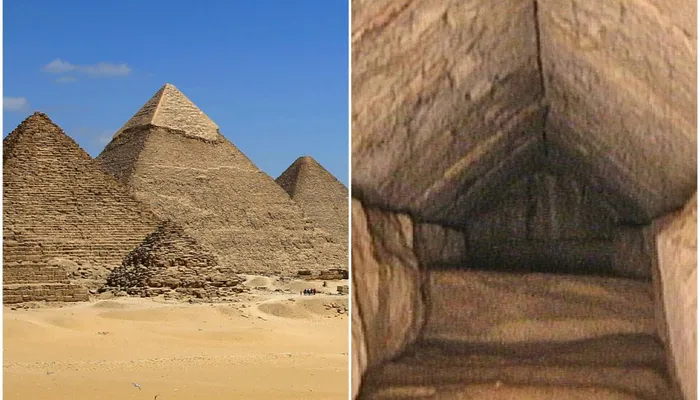The Giza Plateau, home to the legendary Pyramids of Egypt, has mesmerized scholars, explorers, and thrill-seekers for centuries. While the pyramids themselves tower above the desert with timeless majesty, it's what lies beneath that has sparked a new wave of curiosity—and some bold claims. Is there really an underground city beneath Giza? What have scientists actually discovered? Here’s a full deep-dive into the known facts, archaeological breakthroughs, and the enduring mystery that still surrounds the world’s most famous tombs.
Real Discoveries Beneath the Giza Plateau
Forget conspiracy theories—scientific tools like ground-penetrating radar (GPR) and muon tomography are now revealing what's truly beneath the sands of Giza. And the findings are fascinating.
The Subterranean Chamber (Great Pyramid)
Carved deep into the bedrock directly below the Great Pyramid of Khufu is the Subterranean Chamber—an enigmatic void measuring roughly 16 by 27 royal cubits and about 4 meters high. Archaeologists still debate its purpose, with theories ranging from an abandoned burial chamber to a symbolic underworld.
The “Big Void” – ScanPyramids Discovery
In 2017, scientists from the ScanPyramids project discovered a massive 30-meter cavity above the Grand Gallery inside the Great Pyramid. Though it's inaccessible and its function remains unclear, it's the first major internal structure found since the 19th century—suggesting ancient engineers left more behind than we knew.
The Western Cemetery Anomaly
A 2024 study using GPR uncovered a mysterious L-shaped anomaly (10x15 meters) just 2 meters below the surface near the Western Cemetery. The area is still under review, but it points to man-made construction buried beneath centuries of sand.

What About the Rumored "Underground City"?
Let’s clear the air: there is no confirmed underground city beneath the Giza pyramids. Claims of vast chambers, libraries, or tunnel networks sprawling for miles are largely modern myths, often fueled by pseudoarchaeology or viral videos.
What we do know is that the Giza complex has extensive:
-
Tombs carved underground
-
Drainage shafts
-
Hidden corridors
-
A massive workers’ village just south of the plateau—where the pyramid builders lived, worked, and were buried.
These aren’t mythical secrets—they’re part of a real, functioning civilization that supported one of the world’s greatest architectural feats.

Rituals, Psychedelics & Ancient Practices
In a 2024 archaeological chemistry study, researchers revealed that ancient Egyptian ceremonial rituals may have involved psychedelic plants, bodily fluids, and fermented brews. The findings give weight to theories that spiritual or altered-state experiences may have influenced burial rites or sacred architecture—possibly even within the pyramids or associated temples.
Modern Curiosity: MrBeast Enters the Pyramid
In February 2025, YouTuber MrBeast filmed "I Spent 100 Hours Inside the Pyramids!", showcasing rare interior shots and generating over 78 million views in 3 days. While it wasn’t a scientific expedition, it sparked renewed public interest in what might still be uncovered inside—and underneath—Egypt’s oldest wonders.
Ongoing Exploration
Archaeologists continue to explore the Giza Plateau using non-invasive technology. With every scan, excavation, and data model, we're learning more about what lies below and within these ancient monuments.
-
More scans are planned for 2025–2026, especially around the unexplored “voids” detected by ScanPyramids.
-
Egypt's Ministry of Antiquities has invited international teams to further investigate the Western Cemetery anomaly.
No Hidden City, But Real Wonders Underground
There may not be a lost underground metropolis under the pyramids, but the truth is just as incredible. The Giza Plateau hides a complex web of chambers, tunnels, tombs, and technologies we’re only beginning to understand. Each layer unearthed adds to a story written in stone, sand, and timeless wonder.





